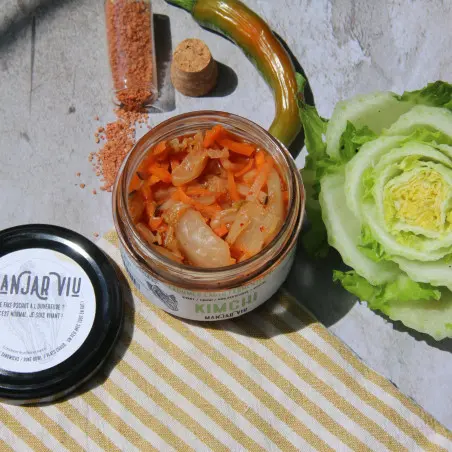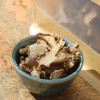The Kimchi, this traditional Korean lacto-fermented dish is gaining popularity worldwide. Rich in flavors and nutrients, it offers many benefits for the health. . In this article, we will explore the Surprising benefits of kimchi, its origin, and how to incorporate it into your daily diet.
After reading this article, you will discover:
- The fascinating history of kimchi and its cultural significance,
- The main health benefits of kimchi,
- How to prepare and consume kimchi optimally,
- Tips for incorporating kimchi into your raw food diet.
The history and cultural significance of kimchi
The Kimchi, a true emblem of Korean cuisine, dates back thousands of years. Originating from the Korean peninsula, this dish Lacto-fermented has evolved over the centuries, adapting to climatic conditions and the tastes of each era. Initially created to preserve the Vegetables During the long winters, kimchi has become a staple of Korean cuisine, symbolizing not only preservation but also culinary ingenuity.
Over time, the recipe for kimchi has undergone numerous variations, each reflecting the available resources and cultural influences of its era. Today, there are hundreds of types of kimchi, each with its regional specificities. In modern Korean cuisine, kimchi is much more than just support ;it is a symbol of sharing and conviviality, often present during family meals or celebrations. The cultural importance of Korean kimchi is such that it is considered an essential element of Korean national identity.

The surprising health benefits of kimchi
Kimchi, a treasure of Korean cuisine, is distinguished by its many beneficial effects for the health, surprising even the most skeptical.
An ally for your digestive system
Kimchi, much more than just a tasty dish, proves to be a valuable ally for our digestive system thanks to its richness in probiotics. These living microorganisms are beneficial and play a crucial role in maintaining the balance of the gut flora. By regularly consuming kimchi, you promote the proliferation of good bacteria in your intestines, which can significantly improve your digestion. Probiotics help reduce common digestive issues such as Bloating and constipation, while optimizing the assimilation of essential nutrients.
Furthermore, the consumption of kimchi helps to strengthen the intestinal barrier, thereby reducing the risk of inflammatory bowel disorders. Scientific studies support these claims, highlighting the positive impact of Lacto-fermented foods on the gut health. By incorporating this Korean dish into a balanced diet, alongside others nutrient-rich and probiotic foods, you offer your digestive system natural support, helping to maintain a healthy gut and to prevent various digestive discomforts. For those interested in a living food and full of probiotics, kimchi presents itself as a delicious and beneficial option.
Boost for your immune system
Kimchi is much more than just a tasty side dish. Here's how it can enhance your immune system :
- Rich in vitamins and minerals : Kimchi is rich in vitamins, particularly vitamin C, and in essential minerals such as iron and the magnesium. These vital components strengthen the immune system by stimulating the production of white blood cells, our allies in the fight against infections.
- Anti-inflammatory properties : Thanks to the lactobacilli from the process of Fermentation, Kimchi has notable anti-inflammatory properties. These natural probiotics play a crucial role in reducing inflammatory markers. Research indicates that these probiotics can reduce chronic inflammation, a key factor in the development of many degenerative diseases (Source: Journal of Medicinal Food, 2021).
Thus, regularly incorporating kimchi into a healthy diet could translate to better resistance to common illnesses such as the cold or the flu.
An asset for your overall well-being
Kimchi is not only good for your gut, but it is also a great asset for your overall well-being. Thanks to its multiple benefits, kimchi is positioned as a live food essential for those looking to naturally boost their immune health. Its consumption does not require major changes in your dietary routine, but it can bring notable improvements to your quality of life.
For more tips on how to incorporate kimchi into your diet, check out our comprehensive guide on the Organic kimchi and its benefits.
Anti-cancer potential
Kimchi, much more than just a dish Lacto-fermented Korean, is a cultural heritage deeply rooted in the culinary and family traditions of Korea. It is also in the spotlight for its potential protective effects against cancer. Several recent studies have highlighted the active compounds present in kimchi, such as:
- Lactobacilli : These beneficial bacteria could play a significant role in the prevention of certain forms of cancer.
- Antioxidants : Known for their ability to neutralize free radicals, which are responsible for oxidative stress and cellular damage that can lead to the development of tumors.
Studies and research
- A study published in the Journal of Medicinal Food revealed that kimchi extracts can inhibit the growth of colon cancer cells, highlighting its potential as a functional food of choice.
- Flavonoids present in the vegetables used for kimchi, such as Chinese cabbage, napa cabbage, and the radish, possess powerful antioxidant properties that contribute to its reputation for health benefits.

How to prepare and consume kimchi
Preparing your own kimchi at home can be a rewarding experience. Not only do you control the quality of the ingredients used, but you can also adjust the flavors to your preferences.
The key ingredients of traditional kimchi
To create a traditional kimchi, certain ingredients are essential to ensure its authenticity and health benefits for the health.
Choice of vegetables
- Chinese cabbage : Main ingredient, rich in fiber and essential nutrients.
- Radishes, carrots, green onions : Complete the cabbage by adding flavor and texture.
Spices and flavors
- Red pepper : Brings the typical spicy touch of kimchi.
- Garlic and ginger : Contribute with their antioxidant and anti-inflammatory properties.
Importance of lactic fermentation
Lactic fermentation is a natural process where the lactic bacteria transform the sugars into lactic acid. Among the different types of fermentation, lactic fermentation is particularly valued for food preservation and its health benefits. This process:
- Improve the digestibility of vegetables.
- Enriches kimchi with probiotics, thereby supporting gut flora and strengthening the immune system.
For those who are new to preparing this dish, it is essential to follow these steps to achieve a kimchi that is both delicious and beneficial.
Tips for a Successful Fermentation
The success of a tasty and beneficial kimchi largely depends on a Fermentation well mastered. Here are some tips to ensure that your homemade kimchi develops its characteristic flavors while preserving its nutritional benefits:
- Optimal conditions for fermentation : Make sure to prepare your kimchi in a clean environment and at room temperature, ideally between 18 and 22 degrees Celsius. This temperature promotes the development of lactobacilli, the beneficial bacteria responsible for lactic fermentation. Also, ensure that your preparation is well submerged to prevent mold. Use a weight to keep the Vegetables under the liquid. Avoid exposure to direct light, which can alter the process.
- Recommended fermentation duration The fermentation duration of kimchi can vary depending on your taste preferences. For a milder taste, a fermentation of 3 to 5 days may be sufficient. If you prefer more pronounced flavors and a more marked tangy taste, let it ferment for up to a week or more. Taste regularly to determine the ideal moment when the kimchi reaches the flavor you like the most. Once the desired taste is achieved, store your kimchi in the refrigerator to slow down the fermentation while preserving its benefits. Armed with these tips, you are ready to experiment with this Korean classic and incorporate it into a diverse diet.
By following these tips, you can easily incorporate kimchi into your eating habits and make it at home.. Not only will it delight your taste buds, but it will also contribute to your overall well-beingthanks to its numerous health benefits. Remember that each kimchi recipe can be unique, and feel free to adjust the ingredients according to your tastes to personalize your culinary experience.
On our store, you will find a whole range of training and webinars dedicated to learning about fermentation techniques and at the practice of a living diet.
Incorporate kimchi into your raw food diet
Incorporate kimchi into your lifestyle focused on a living food, rich in nutrients, can transform your meals into true sources of benefits. Thanks to its richness in probiotics and spicy flavors, kimchi pairs perfectly with a multitude of raw dishes. Whether you are seeking an authentic taste to enhance a traditional recipe or a new culinary adventure, this Korean superfood has everything to appeal to fans of healthy and innovative cuisine. The possibilities are endless and require no cooking, thus respecting the principles of raw food.Raw food and vegan diet.
Raw recipe ideas with kimchi
Here are some raw recipe ideas you can try to make the most of this Korean fermented food:
Crunchy kimchi salads
- Combine various raw vegetables such as grated carrots, spiralized zucchini, and sprouts of mung beans with a generous portion of kimchi.
- Add sesame seeds and a drizzle of sesame oil to enhance the flavors.
- This dish is not only refreshing but also rich in probiotics.
Vegetarian wraps with kimchi
- Use lettuce or cabbage leaves of your choice to wrap slices oflawyer, cucumber sticks, bean sprouts, and kimchi.
- Add a creamy sauce made from cashew nuts mixed with a bit of lemon juice and a pinch of salt for a delicious and nourishing wrap.
Kimchi Detox Smoothies
- Dare to be original with a detox smoothie by blending kimchi with cucumber, celery, and green apples.
- Add some ginger fresh for a spicy and revitalizing touch.
- This surprising smoothie is perfect for boosting your energy while promoting good digestion.
Thanks to these recipes, kimchi becomes an ideal companion to enhance your raw dishes while offering its numerous health benefits. By exploring these ideas, you can not only have a varied diet but also enrich your culinary experience with new and innovative flavors. Take every opportunity to introduce this superfood in your meals and thus actively contribute to your overall well-being.
Also find a Kimcheese recipe on our YouTube channel !
Precautions and considerations
Although kimchi is a tasty and beneficial addition toyour diet, it is essential to consume it in moderation and pay attention to certain considerations. To enjoy its benefits without excess, it is generally recommended to consume a portion of kimchi of about 100 grams per day. This amount allows you to benefit from the probiotics, vitamins, and minerals present in the dish without overloading your digestive system.
However, some people need to exercise caution, as kimchi can cause adverse effects in certain individuals. For example, individuals with cardiovascular diseases might need to limit their consumption of kimchi due to its sodium content, which can influence blood pressure and be a risk factor for hypertension. Additionally, people with thyroid disorders should consume it in moderation, as napa cabbage contains goitrogens that can interfere with iodine absorption, although fermentation reduces the amount. It is also advised for people with digestive sensitivities or inflammatory bowel disorders to test kimchi in small quantities to observe their body's reaction.
Finally, if you are pregnant, breastfeeding, or have specific medical conditions, it is always best to consult a healthcare professional before incorporating new fermented foods into your diet. By practicing mindful consumption and considering your personal needs, kimchi can become a major asset for your health and well-being.
Conclusion
Kimchi, a true gem of Korean cuisine, offers a multitude of health benefits that are increasingly attracting more enthusiasts of living food. Thanks to its richness in probiotics, vitamins, and minerals, it contributes to the balance of the intestinal flora, strengthens the immune system, and could even have protective effects against certain diseases. Its regular consumption, while being a gustatory pleasure, proves to be a natural and effective strategy to improve your overall well-being.
Exploring the many ways toincorporate kimchi into your meals, you open the door to a world of new flavors and an innovative culinary approach that respects the principles of raw and vegan food. Whether you are a novice or experienced in live cuisine, kimchi stands out as a valuable and tasty ally.
For those who wish to deepen their knowledge and discover more tips on raw food and fermented foods, feel free to subscribe to our newsletter. You will find a wealth of information to enrich your daily life with healthy and respectful eating practices. To learn more, visit our dedicated page on the Organic kimchi and its benefits.
Your questions and our answers (FAQ)
What are the main health benefits of kimchi?
Kimchi is rich in probiotics, which helps to rebalance the gut flora and promotes better digestion. It also strengthens the immune system due to its richness in vitamins like vitamin C and essential minerals. Its anti-inflammatory properties help reduce chronic inflammation, thus supporting overall well-being.
How can kimchi be integrated into a raw food diet?
Kimchi can be added to a variety of raw dishes to enrich your live diet. You can incorporate it into crunchy salads, use lettuce leaves to make kimchi wraps, or even create detox smoothies. These recipes allow you to enjoy the nutritional benefits of kimchi while exploring new flavors.
What are the essential ingredients for making traditional kimchi?
The key ingredients of traditional kimchi include Chinese cabbage, radishes, carrots, green onions, red chili, garlic, and ginger. These ingredients are fermented to create a dish rich in probiotics and flavors. Lactic fermentation improves the digestibility of the vegetables and supports gut health.
What is the optimal fermentation time for kimchi?
The fermentation duration of kimchi can vary depending on personal preferences. For a milder taste, a fermentation period of 3 to 5 days is often sufficient. For more pronounced flavors, a fermentation of a week or more can be considered. It is advisable to taste regularly to determine the ideal time to refrigerate the kimchi.
Are there any precautions to take when consuming kimchi?
Although kimchi is beneficial, it is advised to consume it in moderation, about 100 grams per day. People with hypertension, thyroid issues, or digestive sensitivities should exercise caution due to its sodium content. In case of specific medical conditions, consult a healthcare professional before incorporating it into your diet.
What are the anti-cancer properties of kimchi?
Kimchi contains lactobacilli and antioxidants that may play a role in preventing certain forms of cancer. The flavonoids present in the vegetables used for kimchi have antioxidant properties that contribute to its reputation for cellular protection. Studies, such as those published in the Journal of Medicinal Food, have shown that kimchi extracts can inhibit the growth of colon cancer cells.


















